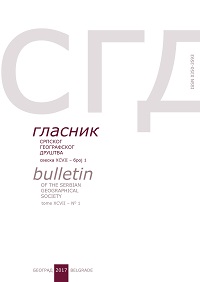Селективни поглед на актуелни макро и микроекономски статус привреде Србије
A selective view upon the current macro- and microeconomic status of Serbian economy
Author(s): Dejana GajinovSubject(s): National Economy, Governance, Economic policy, Economic development, EU-Accession / EU-DEvelopment
Published by: Српско географско друштво
Keywords: economic policy; economic development; State interventions; cooperatives; Serbia;
Summary/Abstract: Serbia does not have any reliable concept of development policy. More precisely, almost entirely the neoclassical development model is carried out, with all its negative consequences on a country which needs high and sustainable growth in a long period of time. Serbia needs macroeconomic stability; less rigid monetary policy; reforms in banking system coupled with the establishment of specialized domestic banks; inducement to developing of small-and-middle size enterprises (SMEs) especially in agriculture, metal and apparel industry, tourism and construction industry; then the enhacement of agricultural production and its international competitiveness by creating the cooperatives in mixed state-private ownership, the enlargement of farms, fulfillment of international standards, the protection of already existing geographic origin and brands, and providing the bounties for export. Being the late-industrializing country Serbia needs to achieve higher productivity rate in relation to technological frontier, but nevertheless the gap will be still wide; therefore State has to gather the funds for export subsidies, reconsider already existing and picking up new trade partners and follow the export-oriented strategy. In relation to foreign direct investments (FDI), the choice has to be made in order to get necessary resources but to preserve the national development strategy. IMF’s neoliberal policy influences heavily on our economic development and we have to offer our own solutions and programmes in order to avoid IMF’s projects. The process of economic integration in EU has to examined in light of our uncompetitiveness, high unemployment rate and cheap labour, as well as constant political pressures.
Journal: Гласник Српског географског друштва
- Issue Year: 86/2006
- Issue No: 2
- Page Range: 129-142
- Page Count: 14
- Language: Serbian

